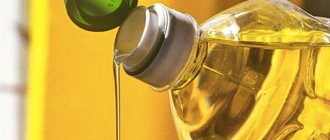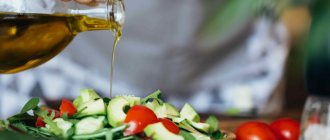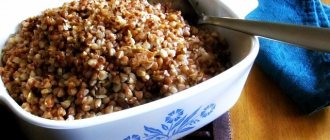Oils derived from plant materials are a valuable source of nutrients and nutrients. The body receives a vitamin-mineral complex, lipids, and fatty acids. It is recommended to include in your diet not just one best vegetable oil, but a combination of products. In this case, the benefit from consumption will be higher.
Oil for frying, refined or unrefined. Is it possible to fry in unrefined oil?
Today, more and more people are trying to follow the basics of a healthy diet. But fried food is still present in the most rational menu. It is impossible to constantly consume steamed and boiled foods. After all, you want to enjoy food, and this is possible without violating the foundations of a healthy lifestyle. Light sautéing or grilling requires the presence of at least a small amount of vegetable oil.
What should you do to avoid all the negative aspects that frying can cause?
What oil should I use? Refined or unrefined?
Vegetable oil is an overly vague term that includes dozens of types and varieties. Olive, sunflower, soy, rapeseed and many others. But still, sunflower remains the most popular in Russia.
Processing methods
- Cold pressed
When sunflower seeds are processed, oil is obtained from them by cold pressing, which is called unrefined. It is this that is the most useful and fragrant. It contains all vitamins, micro- and macroelements. This simple method consists of pressing and then bottling. Since no preservatives are used, the shelf life of the oil is relatively short.
- Hot pressing
Before putting the seeds under the press, they are heated. Because of this, less nutrients remain in the final product, but in general it is also considered unrefined. It is darker in color, but the aroma and taste are preserved.
Some of this oil is filtered and hydrated, thereby further reducing its usefulness.
- Extraction
Raw seeds are poured with an organic solvent similar to gasoline. After separating the oil from them, it is removed with steam, and the remainder with alkali. Then the resulting substrate is bleached and deodorized. After this, it is poured into containers. Such oil can be stored for a very long time, but it will not enrich the body with any beneficial properties or substances.
It would seem that the choice is obvious - we fry in unrefined vegetable oil, because it is so “alive” and healthy. But it was not there. Many have encountered such situations that when frying a dish begins to burn, the oil smokes, foams, splashes, and the product becomes saturated with unpleasant burning odors.
What do you want, give up frying? But what about all the Mediterranean cuisine, which is based on frying various foods in olive oil?
The answer is not entirely clear.
It is worth getting acquainted with such a concept as the “smoke point”. That is, for each type of oil there is a heating temperature at which it begins to smoke. And for unrefined types of oils it is significantly lower than for refined ones. For example, olive oil begins to smoke at 180 degrees C, and sunflower oil at about 105 C.
In addition, unrefined oils contain fiber, numerous organic compounds, fatty acids (palmitic, oleic and others), and enzymes. When heated strongly, they begin to burn and change their chemical composition. Some are even prone to transformation into carcinogenic ones (ketones, aldehydes), as well as the formation of trace fats. All these harmful substances, if consumed regularly, contribute to the formation of cholesterol plaques and increase the risk of developing cancer and cardiovascular diseases.
conclusions
- You can fry in unrefined oil, but you should choose a type that has a higher smoke point (olive, peanut);
- Do not heat the oil too much, preventing it from burning too much;
- Try to combine fried foods with the most healthy ones (fresh salads and vegetables);
- Use non-stick cookware to minimize the amount of oil (spray onto the pan using a spray nozzle, or apply a small amount of oil to a piece of food with a brush);
- Do not reuse used oil;
- Do not reheat cooked food;
- Use napkins to absorb excess oil in fried foods;
- Salt food after cooking to reduce the amount of oil absorbed.
Frying as a method of processing food has a right to exist, but still, in an effort to maintain health and active longevity, you need to try to use it less often. After all, how many not only healthy, but also delicious dishes can be prepared by boiling, stewing or steaming.
The most beneficial qualities of vegetable oils
Nutritionists believe that all types of vegetable oils, without exception, in reasonable quantities will benefit the body . After all, they contain the substances we need:
- Polyunsaturated fatty acids - omega-9, omega-6 and omega-3 Omega-9, which is the most common. The human body is able to synthesize it itself from omega-6 and omega-3 fatty acids. But omega-6 is not produced by the body, so it is considered essential. Omega-3 is generally the most valuable fatty acid. Thanks to it, cell membranes are strengthened, memory and immunity are improved, the level of bad cholesterol in the blood is reduced, and blood vessels dilate.
- Vitamins: A, P, E, D, K, B.
- Micro- and macroelements.
Scientists have proven more than once that those who prefer vegetable oils to animal oils are less susceptible to obesity, problems with blood vessels and the heart. Such people are more active, energetic, have better skin and hair, and are not at risk of early aging.
Grapeseed oil for frying. What oil is best for frying? Oil review
The debate about what is the right way to cook food has been going on for several decades.
What oil is best for frying? Scientific information is constantly changing, and besides, sometimes some food concern aggressively enters into the discussion with an advertisement for its product and changes the perception of part of the public.
For consumers, only the opinion of experts is really important, although it should be taken with a certain restraint.
Scientists' opinion on the best oil for frying
When drawing conclusions about how useful a particular fat is for frying, scientists do not take into account the issue of taste. The fact is that at high temperatures, changes occur in the structure of the oil and various substances harmful to health may arise. And this is what is being discussed in various analyses. In general, it is indicated that those fats that contain monounsaturated fatty acids are better suited for frying. Those in which polyunsaturated fats predominate are better for cold cooking.
Salo
Both pork and goose are suitable, although the latter usually has a higher water content. Therefore, more of it is required for cooking. Lard can be used for excellent cooking; it copes well with high temperatures, but has a high content of saturated acids. And pork is still full of cholesterol. People who lead a healthy lifestyle need to control their consumption.
Palm oil
Very suitable for frying, but, unfortunately, like lard, it has a high content of saturated acids.
Coconut oil
A similar case is with lard and palm lard. Great for preparing a variety of dishes, but be careful with calories and cholesterol!
Rapeseed oil
Refined is often called one of the best oils for frying in terms of saturated acid content. It has another advantage: after frying, it is well absorbed into napkins, and thanks to this, dishes turn out to be somewhat healthier.
Sunflower oil
In refined form, it is also a quality frying oil. Unrefined is only suitable for short cooking and stewing. Of course, if you like a specific taste.
Rice oil
It is very good to cook with, but unfortunately the high price is an obstacle. At high temperatures it overcooks very slowly and has a high content of natural antioxidants.
Corn oil
A universal product. It can be used for frying, stewing and deep-frying. Does not produce any harmful compounds. It is used sparingly, does not smoke and does not burn.
Olive oil
Natural (virgin) is ideal for salads and very quick cooking of vegetables, pasta, frying onions until translucent, etc. Is it possible to fry in olive oil? The usual way is not worth it.
If you want to cook some breaded foods where you need to keep the oil at high temperature for a long time, it is better to choose refined oil, which is not at all suitable for cold cooking.
Butter
For short-term frying (for example, scrambled eggs, toast or roasting vegetables for soup), it can be used, but if heated for a long time, it contains dangerous substances, so it is very unsuitable for this.
But if you heat it, it changes its qualities and withstands a higher heating point.
Examples of unsuitable oils that should not be used for frying at all:
- from grape seeds,
- sesame,
- flaxseed
- soft margarine.
With hydrogenated fats, things are a little more complicated. Some are very high quality, others are quite the opposite, especially those that are cheaper, so it is advisable to avoid them when frying.
Thus, it turns out that there should be at least two bottles of oil on the shelf - one for frying, and the second for cold dishes. Well, before you succumb to the calls of another miracle oil advertisement, remember your everyday experience. Why exchange good things for dubious better ones?
Smoke point and other features
Do you know how to understand which oil is suitable for salads and which for frying? Don't be afraid, you don't need to memorize anything. It is easier to understand the characteristics of different types of vegetable oils if you rely on specific numbers. Namely, the numerical values of the so-called smoke point of the oil.
This indicator indicates at what temperature the oil in the pan begins to smoke. You should not neglect it, since smoking oil contains carcinogens that cause cancer. Each oil has its own smoke point. The higher this indicator, the more suitable the oil for frying. Here is a table with some values:
Another important feature is also the recommended storage conditions and shelf life. For example, flaxseed oil spoils faster than others, so it should only be stored in the refrigerator. But mustard oil itself is a preservative and increases the shelf life of the products it contains.
Mustard oil for frying. Unrefined mustard oil: benefits, harm and use
If you are a little bored and tired of the usual vegetable oils, then turn your attention to unrefined mustard oil. It is produced by pressing mustard seeds. This product can be used as a replacement for sunflower or olive oil when preparing a variety of dishes. Such products are also used in cosmetology.
But it must be used with caution, since, in addition to its beneficial properties, this oil has a number of contraindications.
Beneficial features
When eaten
Unrefined mustard oil has invaluable benefits for the entire body if consumed together with other foods.
- Allows you to cope with pathogenic microorganisms that are in the intestines. Its beneficial effect is manifested in the fight against pathogens of serious diseases such as salmonella, staphylococcus and listeria. Due to these properties, cold-pressed mustard oil is used in hot countries to combat intestinal disorders and as a counteract to food poisoning.
- It is a preventative against cancer - helps reduce the risk of malignant tumors.
- Helps improve the functioning of the digestive system - activates the production of gastric juice and bile. Virgin mustard oil can also increase appetite, so it is recommended to be consumed by people who are underweight and want to gain weight.
Choosing the right one
When choosing a package of oil in a store, remember these tips:
- pay attention to the date of manufacture and expiration date;
- try to choose oils in dark glass bottles. Oil deteriorates faster in light;
- Refined oil is better for frying, and first cold-pressed oil for salads;
- unrefined oils are healthier because they are not chemically processed. But they have a shorter shelf life.
- Purchase expensive, exotic and rare oils exclusively from trusted manufacturers; read the label where the product was produced.
By the way, if you, like me once, are tormented by the question of which oil is healthier, refined or unrefined, relax! Any should be in the kitchen, just use them for their intended purpose! Refined, usually for baking and frying, and unrefined - for dressings and sauces.
Calorie content of vegetable oil per 100 grams of product
Fans of dietary nutrition know well that the healthiest foods are plant foods. Vegetable oil is one of these products, although its calorie content cannot be called low. What are the features of this product and its benefits? How many calories are in 1 tablespoon of sunflower oil?
Sunflower oil and its properties
Everyone knows that in Mediterranean cuisine, dishes are prepared using olive oil. We usually use sunflower oil in cooking. It contains slightly more calories than olive oil. The difference is only 15 calories, but in terms of vitamin E content, sunflower oil is much more valuable. Despite the high calorie content, the sunflower product benefits the body and has a beneficial effect on it.
In ancient times it was called a product of health and longevity. It was believed that by consuming it one could maintain attractiveness and youth for a long time. The most useful is unrefined sunflower oil, since it completely retains all its beneficial properties. It includes:
- vitamins A, D, F, E;
- unsaturated fatty acids;
- tannins;
- phytin;
- lecithin;
- inulin;
- minerals.
The total percentage of fat content in a sunflower seed product is 99.9%, but this figure does not prevent you from consuming it more than cream.
Benefits and Applications
During heat treatment, many beneficial substances and vitamins are destroyed. It is better to use it in unrefined form, and with sediment, it has more benefits and healing properties.
Unsaturated fatty acids are very beneficial for the body. They take an active part in the formation of nerve fiber sheaths and cell membranes. They also help remove cholesterol from the body, which has a positive effect on the condition of the walls of blood vessels. The unrefined product can be used as a remedy against atherosclerosis and diseases of the cardiovascular system.
In folk medicine, this useful substance has long been used for medicinal purposes in the treatment of:
- thrombophlebitis;
- for toothache;
- chronic digestive problems;
- lungs;
- liver.
It is widely used in cosmetology. It is used in aromatherapy, in cosmetic procedures, and bath tinctures are also prepared with it.
It is used most often in cooking; fried and hot dishes and salads are prepared with it. During the cooking process, toxic compounds are formed on the unrefined product. This is very harmful to health, so it is better not to fry food on it in this form.
Calorie content of the product in 100 grams and 1 tablespoon
The composition and calorie content of sunflower oil will depend on the type of seeds, as well as on the method of processing the seeds. It is the most accessible for the majority of our population, therefore it is most often used in cooking.
100 grams of this useful substance contains 899 kcal, of which:
- proteins - 0 g;
- fat - 99.9 g;
- carbohydrates - 0 gr.
Judging by the indicators, 99.9% is fat, but this does not give cause for concern to those who are worried about their figure. Nutritionists believe that you can safely take 2-3 tablespoons of vegetable oil per day. The norm fits into the daily consumption of healthy fats. The bulk of plant species should be unrefined products.
In this form, the sunflower seed product is the most useful. It preserves all vitamins and other beneficial substances for the body. It is distinguished by a pronounced aroma, dark color and the presence of a small sediment. The oil is suitable for dressing salads, but is not suitable for heat treatment.
Product labels from stores almost always indicate its calorie content per 100 grams. If you look at the caloric content of flaxseed, sesame, corn and sunflower oil, then their caloric content is the same. Of the plant species, cold-pressed olive oil has the lowest calorie content. 100 grams of this olive product contain 894 kcal.
In 1 tablespoon of sunflower oil, with a capacity of 18-20 ml, the caloric value is 108-153 units. It is estimated that 1 gram of sunflower seed product contains 8.99 kcal. This indicator makes it easy to calculate the number of calories in 1 tablespoon, since they may differ in capacity.
Methods for obtaining the product and its selection
They learned how to produce sunflower oil a long time ago. It can be obtained in two ways:
- pressing comes down to mechanical squeezing, which can be hot or cold;
- extraction is a more economical method of production, since it allows you to obtain the maximum amount of the finished product. The finished useful substance is extracted using organic solvents.
The product obtained by cold pressing has a pleasant aroma. It is considered the most useful, but it has a drawback - it cannot be preserved for a long time.
You cannot limit your diet to fat-soluble vitamins contained in vegetable oil. Deficiency will negatively affect the health of the body, hair, skin, regeneration, teeth and bones. The number of calories can be easily calculated and the product can be added to food without harm or fear.
Oil calorie table
This table shows the energy value of the most commonly used oils.
Calorie content of vegetable oils (per 100 g of product):
- The calorie content of corn oil is 900 kcal;
- The calorie content of olive oil is 824 kcal;
- The calorie content of sunflower oil is 900 kcal;
- The calorie content of vegetable soybean oil is 900 kcal;
- The calorie content of nut oil is 570 kcal;
- The calorie content of palm oil is 884 kcal.
The calorie content of butter (per 100 g of product) is 750 kcal;
The calorie content of ghee (per 100 g of product) is 885 kcal.
Calorie content and composition of oil
Oil is an indispensable product in the kitchen and one of the main ingredients in the preparation of many dishes. Each has its own calorie content and glycemic index, which both diabetics and people watching their own weight should know about.
Varieties
People, and especially women, have repeatedly wondered which oil is lower in calories and more beneficial for the body. Cream is obtained by using cream in the production process. They, in turn, can be whole or fermented. If we talk specifically about dairy products, the number of calories in butter is higher than in others. It is used both for frying and as one of the main ingredients in dough, sauces and other dishes.
If we talk in more detail about palm oil, it is obtained from the fruits that the palm tree produces, hence the name. Despite the huge number of negative reviews, it is edible and even has its own benefits for the human body. Its chemical composition contains a lot of beta-carotene, which is why the palm product has a red-orange color. In cooking, it is actively used to create confectionery products, since it perfectly replaces other fats and does not spread. You can find the product in mayonnaise, cheese products, and soup mixtures, but you rarely see it in a bottle in the kitchen of a modern housewife.
Diet oil
Due to the high calorie content of oil, it is often thoughtlessly excluded from the diet during diets . In fact, a person needs oil - after all, without fats in the body, many processes simply cannot occur. Therefore, you should not completely give up eating fats. But you need to replace harmful oils and fats in your diet with healthy ones. Refractory animal fats and trans fats (margarine) should be excluded from the diet, and healthy vegetable oils and fish oil should be left. These oils not only contain many vitamins and antioxidants, but also promote weight loss by speeding up metabolism and cleansing the body of waste and toxins; They also remove excess sugar from the blood and bad cholesterol, improve the condition of hair, nails and skin and strengthen the nervous system.
Finally, tips and lifehacks
Always try to have 3-4 types of oil in your house for different purposes, such as olive, sunflower, coconut and sesame. This will diversify your diet well, and it will also be good for your health.
Despite the benefits of vegetable oils, they do not need to replace animal fats. The body needs all this, learn to include them even in your weight loss menu.
Irina Polyanitsa My name is Irina, I am the owner and admin of the site, as well as the author of most of the recipes and articles. I love to cook simple and healthy delicacies. Certified gym instructor, personal trainer. She completed a course on nutrition and health at Stanford University, Stanford Introduction to Food and Health, as well as a course at Ludwig Maximilian University of Munich (LMU) Nutrition and Lifestyle in Pregnancy (about nutrition and lifestyle during pregnancy).
Rescue from the computer
Photo: depositphotos/ChamilleWhite
Hemp oil is considered the most balanced oil in terms of the ratio of Omega-3 and Omega-6 fatty acids. It has a delicate nutty taste, ideal for dressing salads. However, the doctor does not recommend frying on it.
“When hemp oil is heated, aldehydes and lipid peroxides are formed, which have an extremely negative effect on health, including causing cancer,” explains Olga Lushnikova.
Pumpkin oil, according to the expert, improves the functioning of the gastrointestinal tract and liver, stimulates kidney function, promotes the removal of harmful substances from the body, has a strong antiparasitic effect, and reduces the risk of developing chronic inflammatory diseases and respiratory diseases.
Pumpkin oil is effective in the treatment of eye diseases, including myopia, and is an indispensable assistant for those who, due to their occupation, have to spend many hours at the computer. Olga Lushnikova
nutritionist
In addition, this oil is very useful for men: it helps restore sexual function and is used in the treatment of prostatitis and prostate adenoma.











